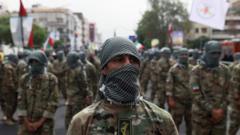Western intelligence agencies indicate an alarming uptick in Iran's activities to silence dissidents and perceived threats outside its borders, with connections emerging between the Iranian regime and various criminal organizations.
**Rising Reports of Iran's Use of Criminal Networks for Assassinations Abroad**

**Rising Reports of Iran's Use of Criminal Networks for Assassinations Abroad**
Iran allegedly relying on organized crime syndicates for extraterritorial targeted killings, according to court filings.
In a troubling trend, recent reports suggest that Iran is increasingly leveraging criminal gangs to execute targeted killings abroad, as indicated by recent court filings and intelligence assessments from the US and Israel. The Iranian regime's attempts to eliminate dissidents, journalists, and political adversaries residing overseas reportedly escalated significantly from 2022 onward, with threats even extending to former US officials, including Donald Trump.
Specific incidents spotlight the alleged role of organized crime in Iran's operations. For instance, recent judicial documents from Turkey and the US have drawn links between Iranian intelligence and notorious criminal figures like Naji Sharifi Zindashti, a reputed drug smuggler implicated in high-profile assassinations. Zindashti's involvement in the murder of Saeed Karimian, the head of a Persian media outlet, illustrates the intersection of crime and state-sponsored operations.
Iran's practices of engaging criminal elements appear to serve as a veil, insulating the regime from direct accountability for its actions. With evidence of Zindashti's connections to various assassination plots, observers have described a relationship between organized crime and Iran's intelligence services, complicating efforts for law enforcement to enforce justice.
Cengiz Erdinc, a Turkish investigative journalist, noted a historical pattern where Iranian intelligence has engaged criminals to carry out attacks on dissidents. This has led to suspicions that figures like Zindashti operate with the tacit approval or collaboration of Iranian authorities.
Instances of kidnapping and assassination plots have also come to light, notably the case involving Iranian dissident Habib Chaab. Following his abduction in Turkey, the subsequent execution of Chaab underscored the brutal methods utilized by Iranian operatives. Furthermore, chilling details have emerged regarding thwarted assassination attempts against Iranian-American activists, indicative of the ongoing risks faced by dissidents.
In light of these developments, the US and UK have enforced sanctions against implicated individuals, including Zindashti, while intelligence officials report heightened threats linked to Iranian operations. The UK's MI5 warned of 20 credible threats against individuals tied to Iran's dissident community within the UK.
The historical context reveals that this strategy of delegating violent operations to criminal networks isn’t new. A notorious case from the early 1990s, where Iranian agents assassinated Kurdish leaders in Berlin, has led to ongoing scrutiny of Iran's methods in dealing with opposition. Today, UK counter-terrorism officials recognize the challenges of infiltrating such criminal groups, noting that they lack ideological ties to the Iranian regime, which may offer a pathway for monitoring and disrupting these connections before further attacks can materialize.
As the situation evolves, the intersection of state-sponsored activities and criminal enterprises raises pressing questions about accountability and the future of dissident safety, both within Iran and in the international community.






















